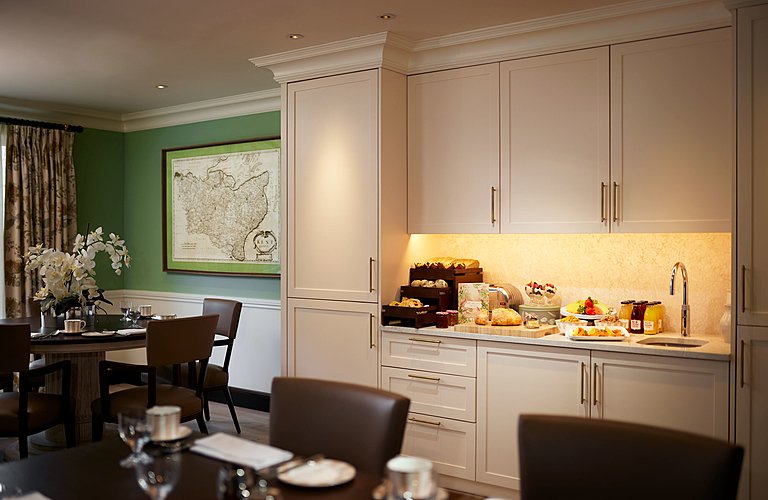192 Sloane Street, London SW1X 9QX

What are The Benefits of Residential Dementia Care?
When caring for someone living with dementia becomes increasingly difficult at home, families often find themselves at a crossroads. The decision to explore residential dementia care can feel overwhelming, yet it often opens doors to enhanced quality of life, specialised support, and peace of mind for everyone involved.
Below, we explore the numerous benefits that specialist dementia care homes can offer, from round-the-clock professional care to enriching social opportunities and tailored environments designed specifically for those experiencing cognitive decline.
Why is Professional Expertise So Valuable in Dementia Care?
Residential dementia care homes employ teams of professionals who have undergone extensive training in understanding and supporting individuals living with various forms of dementia. This expertise goes far beyond basic caregiving – it encompasses a deep understanding of how living with dementia affects communication, behaviour, and daily living.
Care teams in specialist dementia residences understand the importance of person-centred approaches. They recognise that each resident's journey with dementia is unique, requiring individualised strategies and responses. They also excel at reading non-verbal cues, allowing them to respond to needs that residents may struggle to articulate.
The medical oversight available in residential dementia care provides another layer of expertise. Qualified nurses can monitor health conditions, manage medications effectively, and coordinate with GPs and specialists to ensure comprehensive healthcare.
How Does a Specially Designed Environment Help?
The physical environment plays a crucial role in supporting individuals living with dementia, and specialist care homes are thoughtfully designed with this in mind. These purposeful design elements create spaces that promote independence whilst ensuring safety and comfort.
What Makes Dementia-Friendly Design Different?
Dementia-friendly environments incorporate subtle yet effective features that help residents navigate their surroundings with confidence. Clear signage with both words and pictures helps residents find their way independently. Colour-coded areas and doors assist with recognition and reduce confusion. Contrasting colours on floors and walls help with depth perception, whilst avoiding patterns that might cause visual confusion or distress.
How Do Outdoor Spaces Benefit Residents?
Secure gardens and outdoor spaces provide vital connections to nature and opportunities for gentle exercise. Sensory gardens stimulate multiple senses through fragrant plants, textured pathways, and soothing water features.
These spaces offer residents the freedom to explore safely, supporting both physical health and emotional wellbeing. The ability to spend time outdoors, feeling the sun and fresh air, can significantly improve mood and sleep patterns.
What Social Benefits Do Residents Experience?
Living with dementia can be isolating, particularly when mobility or communication difficulties limit social interactions.
Residential dementia care creates natural opportunities for meaningful connections and companionship. Shared mealtimes become social occasions rather than solitary experiences. Residents can form friendships with others who understand their journey, creating a supportive community where everyone belongs. Group activities tailored to varying abilities ensure everyone can participate and feel valued.
From gentle exercise classes to music sessions and craft workshops, these activities provide structure, stimulation, and joy throughout the day. The presence of caring staff who know each resident personally creates additional social connections. These relationships, built on understanding and respect, often become deeply meaningful to residents, providing consistent emotional support and companionship.
How Does Specialist Care Support Family Relationships?
When families no longer bear the full weight of caregiving responsibilities, relationships often transform in positive ways. Visits become opportunities for quality time together rather than stressful caregiving sessions. Family members can return to their roles as spouses, children, or siblings, focusing on emotional connection rather than practical care tasks.
Professional carers also provide valuable support to families, offering guidance on communicating effectively with their loved one and understanding dementia-related changes. This education and support help families maintain meaningful relationships despite the difficulties dementia presents. Regular updates from care teams keep families informed and involved in their loved one's care, creating a true partnership approach.
What Practical Advantages Does Residential Care Offer?
The practical benefits of residential dementia care extend beyond the obvious advantage of 24-hour support. Specialist residences handle numerous complex aspects of care that can overwhelm family carers. Medication management becomes streamlined and reliable, with trained staff ensuring correct dosages and timing.
Nutritional needs are met through carefully planned meals that accommodate both preferences and dietary requirements. Professional chefs create appetising meals that encourage good nutrition, whilst trained staff provide appropriate assistance during mealtimes. Personal care support maintains dignity whilst ensuring hygiene and comfort.
Professional carers are skilled at providing this intimate care respectfully, often with less resistance than family members might encounter. They understand techniques for making personal care routines feel less invasive and more like normal daily activities.
Experience Exceptional Dementia Care with KYN
If you're considering residential dementia care for a loved one, KYN offers an exceptional standard of support in beautiful, purpose-built environments across London. Our approach honours each individual's unique journey with dementia, providing personalised care that maintains dignity, encourages independence, and enriches daily life.
Our dedicated teams create genuine connections with residents, ensuring they feel valued, understood, and truly at home. To discover more about our dementia care services and explore our stunning residences, please reach out today. Complete our online enquiry form to request a brochure or arrange a visit.

